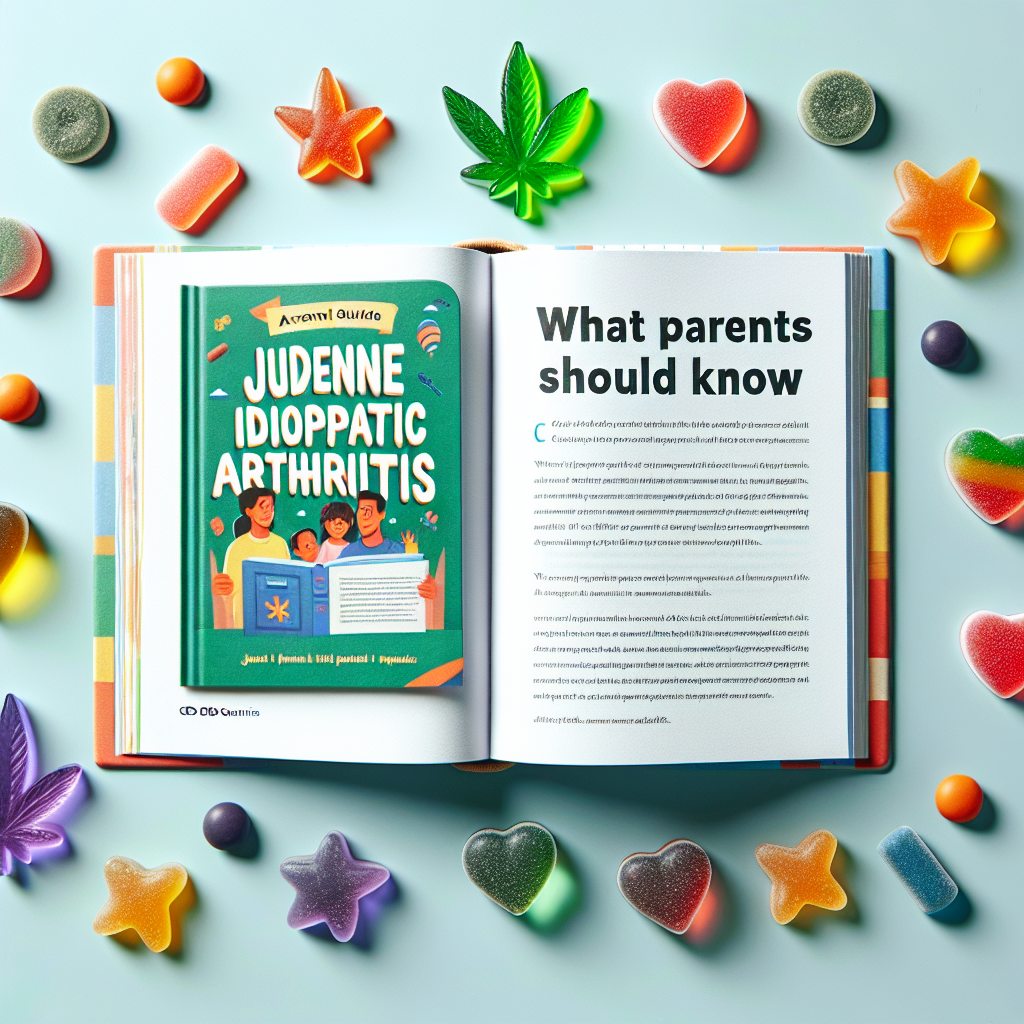-
Table of Contents
“Empowering Parents: Understanding Juvenile Idiopathic Arthritis and the Potential of CBD Gummies”
SALE: Buy Premium CBD Gummies!
Each delicious gummy is infused with high-quality CBD to help alleviate pain, reduce stress, and enhance your mental well-being. Perfect for those seeking a natural way to unwind and support overall health.
Buy NowJuvenile Idiopathic Arthritis (JIA) is a chronic inflammatory condition affecting children under the age of 16, characterized by persistent joint inflammation, pain, and stiffness. It is the most common type of arthritis in children and can significantly impact their quality of life, potentially leading to long-term joint damage and disability if not properly managed. Treatment typically involves a combination of medication, physical therapy, and lifestyle adjustments to control symptoms and prevent complications.
In recent years, there has been growing interest in the potential therapeutic benefits of cannabidiol (CBD) for various health conditions, including JIA. CBD, a non-psychoactive compound derived from the cannabis plant, is believed to have anti-inflammatory and pain-relieving properties. CBD gummies, a popular form of CBD consumption, offer a convenient and palatable option for children. However, parents should be well-informed about the efficacy, safety, and regulatory aspects of CBD use in pediatric populations before considering it as a complementary treatment for JIA. This introduction aims to provide an overview of JIA and the considerations parents should take into account regarding the use of CBD gummies for their children.
SALE: Buy Premium CBD Gummies!
Each delicious gummy is infused with high-quality CBD to help alleviate pain, reduce stress, and enhance your mental well-being. Perfect for those seeking a natural way to unwind and support overall health.
Buy NowUnderstanding Juvenile Idiopathic Arthritis: Symptoms, Causes, and Treatment Options

SALE: Buy Premium CBD Gummies!
Each delicious gummy is infused with high-quality CBD to help alleviate pain, reduce stress, and enhance your mental well-being. Perfect for those seeking a natural way to unwind and support overall health.
Buy NowJuvenile Idiopathic Arthritis (JIA) is a chronic condition that affects children under the age of 16, causing persistent joint inflammation and stiffness. This autoimmune disorder can be particularly challenging for young patients and their families, as it often disrupts daily activities and can lead to long-term health complications. Understanding the symptoms, causes, and treatment options for JIA is crucial for parents seeking to manage their child’s condition effectively.
The symptoms of JIA can vary widely, but common indicators include joint pain, swelling, and stiffness, particularly in the morning or after periods of inactivity. Some children may also experience fever, fatigue, and a rash. These symptoms can be intermittent, with periods of flare-ups followed by times of remission. Early diagnosis is essential, as untreated JIA can lead to joint damage and growth problems. Pediatric rheumatologists typically use a combination of physical examinations, blood tests, and imaging studies to diagnose the condition.
SALE: Buy Premium CBD Gummies!
Each delicious gummy is infused with high-quality CBD to help alleviate pain, reduce stress, and enhance your mental well-being. Perfect for those seeking a natural way to unwind and support overall health.
Buy NowThe exact cause of JIA remains unknown, but it is believed to involve a combination of genetic and environmental factors. The immune system mistakenly attacks the body’s own tissues, leading to inflammation. While there is no cure for JIA, various treatment options can help manage symptoms and improve quality of life. Traditional treatments often include nonsteroidal anti-inflammatory drugs (NSAIDs), disease-modifying antirheumatic drugs (DMARDs), and biologic agents that target specific components of the immune system. Physical therapy and regular exercise are also important to maintain joint function and overall health.
In recent years, there has been growing interest in alternative treatments, including the use of cannabidiol (CBD) gummies. CBD, a non-psychoactive compound derived from the cannabis plant, has been touted for its potential anti-inflammatory and pain-relieving properties. Some parents have turned to CBD gummies as a complementary approach to traditional JIA treatments, hoping to alleviate their child’s symptoms with fewer side effects.
However, it is important for parents to approach CBD with caution. While preliminary studies suggest that CBD may offer some benefits for inflammatory conditions, research specifically on its effects in children with JIA is limited. The lack of standardized dosing guidelines and potential interactions with other medications are significant concerns. Moreover, the regulatory landscape for CBD products is still evolving, and the quality and purity of over-the-counter CBD gummies can vary widely.
Before considering CBD gummies for their child, parents should consult with their child’s healthcare provider. A pediatric rheumatologist can offer guidance on the potential risks and benefits, as well as monitor for any adverse effects. It is also essential to choose high-quality CBD products from reputable sources to ensure safety and efficacy.
In conclusion, managing Juvenile Idiopathic Arthritis requires a comprehensive approach that includes traditional medical treatments, lifestyle modifications, and, in some cases, alternative therapies like CBD gummies. While the promise of CBD is intriguing, parents must navigate this option with careful consideration and professional guidance. By staying informed and working closely with healthcare providers, parents can help their children lead active and fulfilling lives despite the challenges of JIA.
The Potential Benefits of CBD Gummies for Managing Juvenile Idiopathic Arthritis
Juvenile Idiopathic Arthritis (JIA) is a chronic condition that affects children, causing persistent joint inflammation, pain, and stiffness. For parents, watching their child struggle with the symptoms of JIA can be heart-wrenching. Traditional treatments often include nonsteroidal anti-inflammatory drugs (NSAIDs), corticosteroids, and disease-modifying antirheumatic drugs (DMARDs). However, these medications can come with a host of side effects, prompting many parents to seek alternative or complementary therapies. One such alternative that has been gaining attention is cannabidiol (CBD) gummies.
CBD, a non-psychoactive compound derived from the cannabis plant, has been lauded for its potential anti-inflammatory and pain-relieving properties. Unlike tetrahydrocannabinol (THC), CBD does not produce a “high,” making it a more appealing option for parents concerned about the psychoactive effects of cannabis. CBD gummies, in particular, offer a convenient and palatable way for children to consume CBD, which can be especially beneficial for those who may be averse to other forms of medication.
Research into the efficacy of CBD for managing JIA is still in its infancy, but preliminary studies and anecdotal evidence suggest that it may help alleviate some of the symptoms associated with the condition. For instance, a study published in the European Journal of Pain found that CBD applied topically could help reduce pain and inflammation in animal models of arthritis. While these findings are promising, it is important to note that more rigorous clinical trials involving human subjects are needed to confirm these benefits.
In addition to its potential anti-inflammatory properties, CBD may also help improve sleep and reduce anxiety, both of which are common issues for children with JIA. Chronic pain can significantly disrupt sleep patterns, leading to fatigue and a decreased quality of life. By potentially alleviating pain and promoting relaxation, CBD gummies could help children achieve more restful sleep. Moreover, the stress and anxiety associated with living with a chronic condition can be overwhelming for young patients. CBD has been shown to have anxiolytic effects, which could help ease the mental burden of JIA.
However, it is crucial for parents to approach CBD with caution. The market for CBD products is largely unregulated, leading to concerns about the purity and potency of available products. Parents should seek out reputable brands that provide third-party lab testing to ensure the safety and efficacy of their products. Consulting with a healthcare provider before introducing CBD into a child’s treatment regimen is also essential. A medical professional can offer guidance on appropriate dosages and monitor for any potential interactions with existing medications.
While the potential benefits of CBD gummies for managing JIA are intriguing, they should not be viewed as a cure-all. CBD may offer symptomatic relief, but it is unlikely to address the underlying causes of the condition. Therefore, it should be considered as part of a comprehensive treatment plan that includes traditional medical interventions, physical therapy, and lifestyle modifications.
In conclusion, CBD gummies present a promising, albeit still experimental, option for managing the symptoms of Juvenile Idiopathic Arthritis. For parents desperate to find relief for their children, the potential benefits of CBD—ranging from pain relief to improved sleep and reduced anxiety—are worth exploring. However, due diligence is necessary to ensure the safety and efficacy of these products. By working closely with healthcare providers and choosing high-quality CBD products, parents can make informed decisions that may improve their child’s quality of life.
Safety and Efficacy: What Parents Should Know About CBD Gummies for Children with Juvenile Idiopathic Arthritis
Juvenile Idiopathic Arthritis (JIA) is a chronic condition that affects children, causing persistent joint inflammation, pain, and stiffness. For parents, managing their child’s symptoms can be a daunting task, often involving a combination of medications, physical therapy, and lifestyle adjustments. Recently, there has been growing interest in the potential use of CBD (cannabidiol) gummies as a complementary treatment for JIA. However, before considering this option, it is crucial for parents to understand the safety and efficacy of CBD gummies for children with this condition.
CBD, a compound derived from the cannabis plant, has gained popularity for its purported anti-inflammatory and pain-relieving properties. Unlike THC (tetrahydrocannabinol), another compound found in cannabis, CBD does not produce a psychoactive effect, making it a more appealing option for pediatric use. Despite its growing popularity, the use of CBD in children, particularly those with JIA, remains a topic of ongoing research and debate.
One of the primary concerns for parents is the safety of CBD gummies for their children. The Food and Drug Administration (FDA) has not yet approved CBD for the treatment of JIA, and there is limited data on its long-term effects in children. While some studies suggest that CBD may be well-tolerated in pediatric populations, potential side effects such as drowsiness, gastrointestinal issues, and changes in appetite have been reported. Moreover, the lack of standardized dosing guidelines adds another layer of complexity, making it challenging for parents to determine the appropriate amount for their child.
In addition to safety concerns, the efficacy of CBD gummies in managing JIA symptoms is still under investigation. Preliminary research and anecdotal evidence indicate that CBD may help reduce inflammation and alleviate pain, offering a glimmer of hope for parents seeking alternative treatments. However, these findings are not yet conclusive, and more rigorous clinical trials are needed to establish the effectiveness of CBD for JIA. It is also important to note that the quality and concentration of CBD can vary significantly between products, potentially impacting their efficacy.
Given these uncertainties, it is essential for parents to consult with their child’s healthcare provider before introducing CBD gummies into their treatment regimen. A medical professional can provide guidance on potential interactions with existing medications and help monitor for any adverse effects. Additionally, parents should seek out reputable sources for CBD products, ensuring they are third-party tested for purity and potency.
While the allure of a natural remedy like CBD is understandable, it is crucial for parents to approach this option with caution. The current lack of comprehensive research means that the long-term implications of CBD use in children with JIA remain unknown. Until more definitive evidence is available, traditional treatments and therapies should remain the cornerstone of managing this condition.
In conclusion, the potential use of CBD gummies for children with Juvenile Idiopathic Arthritis is a complex and evolving topic. While early indications suggest that CBD may offer some benefits, the safety and efficacy of this treatment are not yet fully understood. Parents must weigh the potential risks and benefits carefully, always prioritizing the well-being of their child. By staying informed and working closely with healthcare providers, parents can make the best decisions for managing their child’s JIA symptoms.

